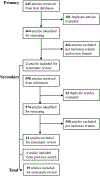Interventions for Children with Neurocognitive Impairments in Resource-Limited Settings: A Systematic Review
- PMID: 32968334
- PMCID: PMC7505233
- DOI: 10.1016/j.childyouth.2020.105393
Interventions for Children with Neurocognitive Impairments in Resource-Limited Settings: A Systematic Review
Abstract
Many children and adolescents around the world suffer from neurocognitive deficits due to chronic disorders, such as Human Immunodeficiency Virus (HIV) and malaria. Resource-limited settings exacerbate the risk of negative cognitive outcomes due to high prevalence of associated disorders, poverty, and limited access to interventions. Current literature does not provide consensus regarding the efficacy of interventions to support children with cognitive impairments in low-resource settings. This research aimed to identify and evaluate interventions for youth with neurocognitive deficits in resource-limited settings. A systematic review of peer-reviewed literature was conducted within five databases (PubMed, Web of Science, CINAHL, PsycInfo, and WHO Index Medicus). Cognitive impairment was broadly defined to be inclusive of aspects of intellectual and cognitive functioning (e.g., working memory, attention, executive function). The income status of the country or countries in which each study was located was determined according to World Bank Income Status. Studies conducted in countries classified as low- or middle-income were included. Since low-resource areas exist within high-income countries, the resource availability within study settings in high-income countries was systematically evaluated for inclusion. The search yielded 19 articles that met all inclusion criteria. Interventions included strategies involving caregiver training, computerized and non-computerized cognitive training, physical activity, and nutritional supplementation. Interventions were administered in medical facilities, educational facilities, or the home. The majority of the interventions targeted the domains of memory and attention. Overall, the efficacy of interventions was inconsistent. Further, results indicated that the relationship between cognitive improvement and intervention types was not consistent across cognitive domains. However, when evaluating studies on an individual basis, some strategies demonstrated clinically- and statistically-significant improvement in cognitive function among specific groups of children. The low article yield highlights that few researchers have evaluated pediatric cognitive support interventions in low-resource contexts. This review suggests support strategies that should be considered for future studies as neurocognitive screening capacity improves in resource-limited settings.
Keywords: Neurocognitive Impairment; Resource-Limited Setting; Support Strategies; Systematic Review; Youth.
Conflict of interest statement
Declaration of Competing Interests None.
Figures
Similar articles
-
Beyond the black stump: rapid reviews of health research issues affecting regional, rural and remote Australia.Med J Aust. 2020 Dec;213 Suppl 11:S3-S32.e1. doi: 10.5694/mja2.50881. Med J Aust. 2020. PMID: 33314144
-
Factors associated with youth gang membership in low- and middle-income countries: a systematic review.Campbell Syst Rev. 2018 Nov 29;14(1):1-128. doi: 10.4073/csr.2018.11. eCollection 2018. Campbell Syst Rev. 2018. PMID: 37131383 Free PMC article.
-
Recovery schools for improving behavioral and academic outcomes among students in recovery from substance use disorders: a systematic review.Campbell Syst Rev. 2018 Oct 4;14(1):1-86. doi: 10.4073/csr.2018.9. eCollection 2018. Campbell Syst Rev. 2018. PMID: 37131375 Free PMC article.
-
Behavioural modification interventions for medically unexplained symptoms in primary care: systematic reviews and economic evaluation.Health Technol Assess. 2020 Sep;24(46):1-490. doi: 10.3310/hta24460. Health Technol Assess. 2020. PMID: 32975190 Free PMC article.
-
Public sector reforms and their impact on the level of corruption: A systematic review.Campbell Syst Rev. 2021 May 24;17(2):e1173. doi: 10.1002/cl2.1173. eCollection 2021 Jun. Campbell Syst Rev. 2021. PMID: 37131927 Free PMC article. Review.
Cited by
-
Association between HIV and cytomegalovirus and neurocognitive outcomes among children with HIV.AIDS. 2024 Nov 15;38(14):1972-1977. doi: 10.1097/QAD.0000000000004000. Epub 2024 Aug 28. AIDS. 2024. PMID: 39206927
-
Nutritional Quality Implications: Exploring the Impact of a Fatty Acid-Rich Diet on Central Nervous System Development.Nutrients. 2024 Apr 8;16(7):1093. doi: 10.3390/nu16071093. Nutrients. 2024. PMID: 38613126 Free PMC article. Review.
-
Neurocognitive deficits and socioeconomic risk factors among children and adolescents living with HIV in sub-Saharan Africa: a systematic review.Child Adolesc Psychiatry Ment Health. 2022 Apr 27;16(1):31. doi: 10.1186/s13034-022-00465-y. Child Adolesc Psychiatry Ment Health. 2022. PMID: 35477577 Free PMC article. Review.
References
Grants and funding
LinkOut - more resources
Full Text Sources
Miscellaneous


